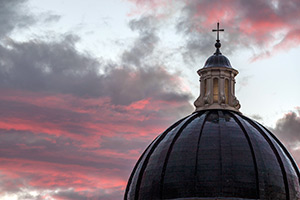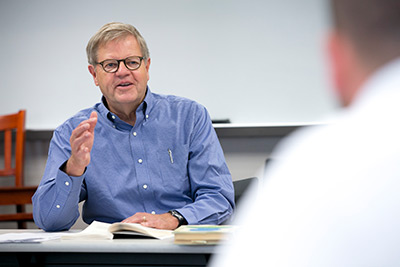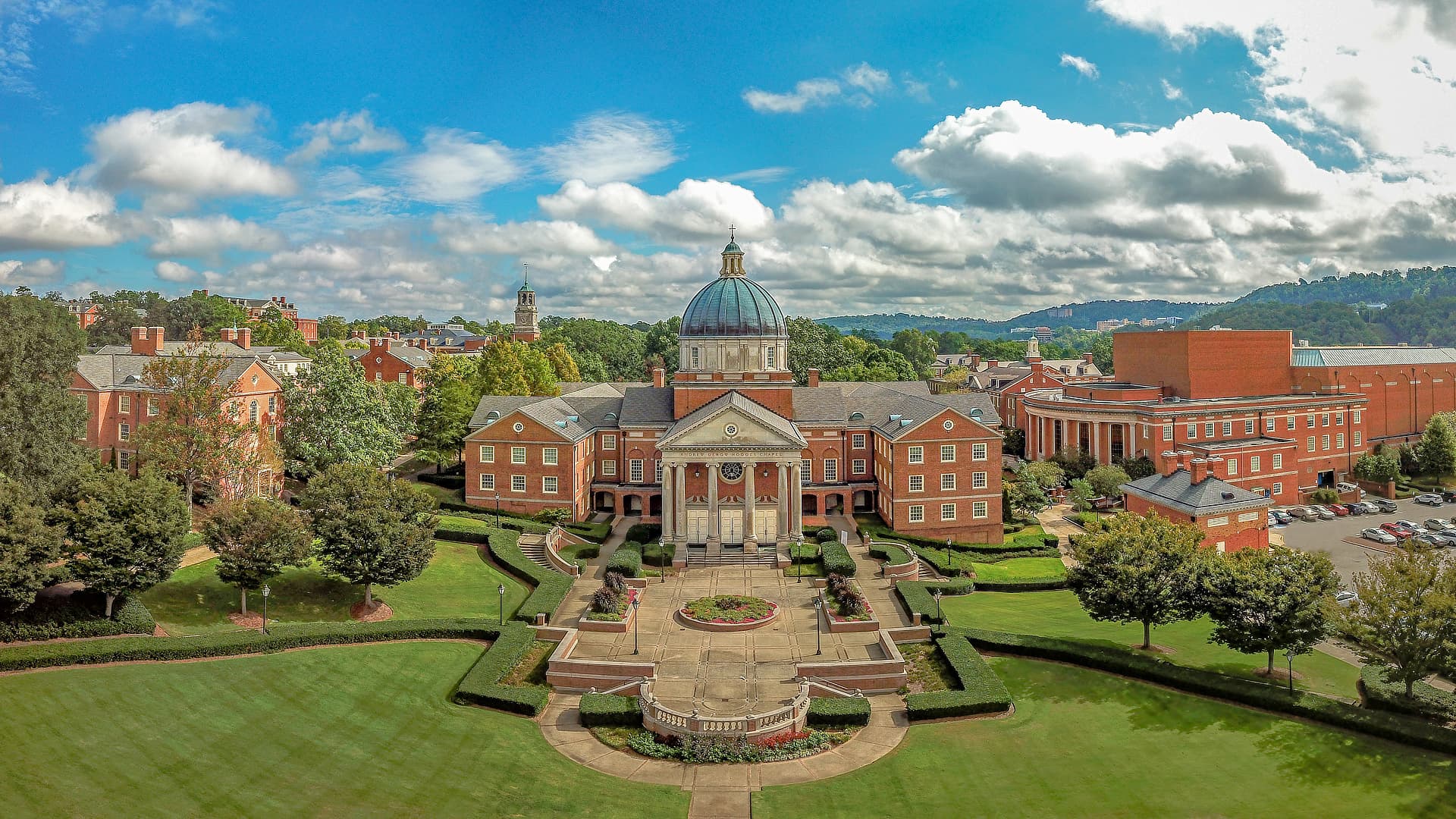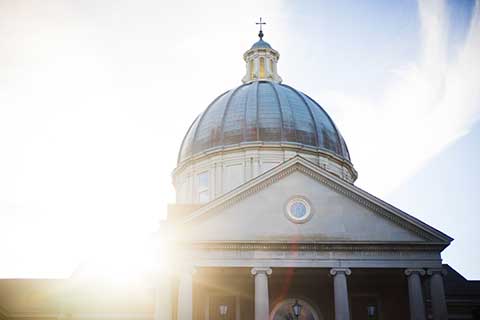Samford University’s Beeson Divinity School opened its doors in the fall of 1988 to an entering class of 32 full-time students. Much has changed. The Beeson Divinity School family now includes more than 1,300 graduates serving the Lord on six continents. Much remains the same. We continue to be loyal to our core commitments. We are committed to the life of the church, to the practice of spiritual disciplines, to the total truthfulness of Holy Scripture, to the centrality of preaching, to the mission and unity of the church in the world and to the great principles that characterized the Protestant Reformation.
At Beeson Divinity School, we frequently say, “Above all else, we want our students to be men and women of God.” We welcome you gladly to join with us as we press “toward the high calling” of God in Jesus Christ. Soli Deo Gloria!
History

On February 9, 1988, the Board of Trustees of Samford University authorized the establishment of the School of Divinity beginning in the 1988-1989 academic session. In one sense, this action fulfilled the founding purpose of the University adopted in 1841 which provided for "the establishment of a Theological Institution, connected with the college hereinafter established."
In December 1988, the Samford Board of Trustees voted to name the school the Beeson School of Divinity in honor of Ralph Waldo Beeson and his late father, John Wesley Beeson. Ralph Beeson provided what was, at that time, the largest gift from a living individual in Samford history to establish the first divinity school at a Baptist college or university in the nation. It was Mr. Beeson's desire that the school be interdenominational and evangelical in character, providing a rigorous program for the preparation of ministers for the Church of Jesus Christ.
Dr. Timothy George served as founding dean of the school, stepping down from that position in 2019. Over the course of his 31 years of leadership, George helped to establish a solid foundation for the school, building a world-class faculty and graduating over 1,000 students to serve in Christian ministry around the globe.
Dr. Douglas Sweeney has served as dean of Beeson Divinity School since 2019. With 18 full-time faculty members and a staff of 16, Beeson offers the Master of Divinity, Master of Arts in Theological Studies, Master of Arts in Christian Counseling, Master of Theology and Doctor of Philosophy in Theology for the Church.
Beeson Divinity School is one of ten schools that make up Samford University.
Mission
Core Values

Confessional
We are committed to the great tradition of historic Christian orthodoxy.
Evangelical
We are committed to the full inspiration and total truthfulness of Holy Scripture.
Interdenominational
We welcome and celebrate denominational diversity within our faculty and student body.
Reformational
We are committed to the theological principles characterized in the Protestant Reformation: Sola Gratia, Sola Fide, Sola Scriptura, Solus Christus and Soli Deo Gloria!
Our Commitments
We believe in face-to-face theological education for the purpose of face-to-face Gospel ministry. Thus, we maintain a low faculty to student ratio (1:8) and keep class sizes small (average 12-15 students per class). All faculty and full-time students participate in weekly faculty-led mentor groups. Because of these commitments, we do not offer online or distance education.
We believe that, more than anything, worship of the Triune God forms us into the image of Jesus Christ and fits us for ministry. Thus, all faculty, staff and full-time students are expected to worship together in weekly chapel services. Christian worship unites us in fellowship. So we also eat together in the Beeson Commons each week after chapel services.
Diversity Statement
The faculty of Beeson Divinity School adopted the following diversity statement in the spring of 2023:
Introduction
By charter, Beeson Divinity School (BDS) is a doctrinally orthodox Protestant community, interdenominational and evangelical. We affirm the full trustworthiness of Scripture and adhere to historic confessions and creeds. Our faculty, staff and students are committed to providing and receiving theological education through study, worship and fellowship. As is fitting, given our home in Birmingham, Alabama, a significant city in the history of American Civil Rights, BDS has sought to embrace biblical diversity and practice biblical justice since our founding in 1988.
Scriptural Basis of Diversity, Unity and Justice
The Bible opens with a breathtaking description of divinely instituted diversity in creation that includes persons of many races and lands (Genesis 1-11) and concludes with an equally stunning vision of a united multi-racial people of God living in a renewed creation (Revelation 20-22). This diversity includes gender, racial, geographical, communal, socioeconomic, and, thus, cultural differences as part of being made in God’s image in God’s world (Genesis 1:26-31).
In light of these and other passages in Scripture, we recognize that our primary identity is as children created in God’s image. Regardless of ability, disability, racial, ethnic or socioeconomic background, whether male or female, all people bear God’s image. Thus, they possess inherent dignity and are worthy of respect. Furthermore, as a community of Christians, we humbly acknowledge that we are redeemed by Jesus Christ our Lord (John 1:12; Galatians 3:27-28). We seek to be his disciples.
Though deeply affected by individual and corporate sin (Genesis 3:1-24), God’s people at their best display unity that crosses racial lines in marriage (Numbers 12:1), treatment of the poor and the stranger (Leviticus 25:23-55; Deuteronomy 10:18), the composition of faith communities (Ruth 4:7-22; Acts 10:1-48), and ministry partnerships (Colossians 4:7-18). They demonstrate unity in shared ministry (Eph 4:1-7, 11-16), conducted by both men and women (Luke 8:1-3; Acts 2:13-14; 18:1-26; Romans 16:1-3). This unity derives from the unified triune God, who “shows no partiality” (Acts 10:34). This unity is not optional, for Christ requires love for God and neighbor as defined in Scripture (Leviticus 19:17-19, 34-37; Deuteronomy 6:1-9; Mark 12:28-32). To please God, the policies, ethos and activities of BDS must reflect the breadth and particularity of this biblical mandate.
Community Members and Community Practices
Throughout Beeson’s history, our community has been enriched by male and female students, faculty and staff representing many nations, racial backgrounds, socio-economic settings and levels of ability. Beeson is committed to complying with the Americans with Disabilities Act and creating an environment in which faculty, staff and students love and support their colleagues. We take a traditional, biblical approach to gender identity and sexual expression, teaching that one’s manhood or womanhood is bestowed by God at conception and that sexual activity outside of marriage between a man and a woman is sinful. The school seeks unity within its diversity of conviction through conversations and actions anchored in the Bible, community worship and personal and corporate spiritual formation. As we recite at the beginning of each semester in our Inaugural Covenant, “We confess that we are all learners together in the school of faith. We will be cautious in criticism and prompt in forgiveness.”
Future Steps
With gratitude to those who have come before and worked toward these same goals, the school will continue to use its resources and influence to help students who sense a God-given call to ministry in the Church of Jesus Christ. The school will also strive to call persons to the faculty, staff and student body who strengthen or expand our denominational, racial, socioeconomic and gender diversity. Finally, we will seek out programs and create opportunities to help us listen to and learn from one another more carefully as we serve a world in need.
We pray the Lord would grant us humility and grace to show Christlikeness to all people. In those areas where we have fallen short, we are grateful for God’s mercy and for giving us hearts of repentance and forgiveness. Moreover, we seek God’s wisdom for growth, increased resources and reallocation of existing resources as needed for ongoing progress.
Statement of Faith
At the founding of Beeson Divinity School in 1988, "The Baptist Faith and Message" (1963) was adopted by the Samford University Board of Trustees as the confessional standard for the school. We affirm without reservation the total truthfulness of Holy Scripture and the great principles of historic Christian orthodoxy embodied in this statement of faith. At the same time, in accordance with the desires of Ralph Waldo Beeson, the school was established as a "Christian, Protestant, evangelical and interdenominational" theological community. We all agree to teach in accordance with and not contrary to those evangelical essentials of the Christian faith, such as the Holy Trinity, the person and work of Jesus Christ, salvation by grace alone and a life of discipleship and faithful obedience to God's Word. Members of the divinity school faculty who are not Baptist by denomination submit in writing their own convictions concerning those articles in the statement of faith that touch on denominational distinctions. In this way, we seek to preserve both the theological integrity and the interdenominational variety of our faculty as set forth in the founding documents of the school.
The Apostles' Creed, which is etched in stone in Andrew Gerow Hodges Chapel, also expresses our common commitment to the historic faith of the church.. In addition, students who apply for admission to Beeson Divinity School are asked to submit an essay based on the Apostles' Creed.
Apostles' Creed
I believe in God, the Father almighty,
maker of heaven and earth;
And in Jesus Christ his only son our Lord;
who was conceived by the Holy Ghost,
born of the Virgin Mary,
suffered under Pontius Pilate,
was crucified, dead, and buried.
He descended into hell.
The third day he rose again from the dead.
He ascended into heaven,
and sitteth on the right hand of
God the Father almighty.
From thence he shall come to judge
the quick and the dead.
I believe in the Holy Ghost,
the holy catholic Church,
the communion of saints,
the forgiveness of sins,
the resurrection of the body,
and the life everlasting.
Amen.
Inaugural Covenant
The Inaugural Covenant was drafted by the first incoming class at Beeson Divinity School and is renewed by the community each academic year.
Leader: Having been led, as we believe, by the providence of God to be a member of this community of faith and learning, and in acknowledgment of the stewardship of this new beginning, we make the following solemn covenant with one another in the presence of the angels and the living God.
People: We are here because the call of God has come to us from beyond ourselves. We desire to be faithful ministers of the church of Jesus Christ. We commit ourselves to diligence in study, devotion in personal and corporate worship, fidelity in our relationships, and holiness of life, that we might better serve one another and the body of Christ.
Leader: We pledge to love one another and encourage one another in the disciplines of the Christian life. We confess that we are all learners together in the school of faith. We will be cautious in criticism and prompt in forgiveness.
People: We believe that personal faith in Jesus Christ is the only way to salvation for all who were, are now, or ever shall be. Therefore, we will seek in word and deed to bear witness of His love and grace to all persons everywhere.
ALL: Having in good faith made our covenantal commitments, and with God’s help and grace, we, therefore, pledge to be faithful stewards of time, talents and opportunities in order that we, in this semester at Beeson Divinity School, might model a lifestyle of service and devotion to the end that God will be glorified in ever-increasing measure.
Accreditation
We are accredited by SACSCOC and by ATS in the United States and Canada to award the following degrees:
- Master of Divinity (MDiv)
- Master of Arts in Theological Studies (MATS)
- Master of Theology (ThM)
- Master of Arts in Christian Counseling (MACC)
- Doctor of Philosophy in Theology for the Church (PhD)
Samford University is accredited by the Southern Association of Colleges and Schools Commission on Colleges (SACSCOC) to award associate, baccalaureate, masters, educational specialist, and doctorate degrees. Samford University also may offer credentials such as certificates and diplomas at approved degree levels. Questions about the accreditation of Samford University may be directed in writing to the Southern Association of Colleges and Schools Commission on Colleges at 1866 Southern Lane, Decatur, GA 30033-4097, by calling (404) 679-4500, or by using information available on SACSCOC’s website (www.sacscoc.org).
Accreditation Contact Information
For questions about accreditation, please contact:
The Southern Association of Colleges and Schools Commission on Colleges
The Association of Theological Schools Commission on Accrediting
Samford University is an Equal Opportunity Institution that complies with applicable law prohibiting discrimination in its educational and employment policies and does not unlawfully discriminate on the basis of race, color, sex, age, disability, veteran status, genetic information or national or ethnic origin.
Statement of Educational Effectiveness
The faculty and staff of the Divinity School are committed to the fulfillment of our mission and to rigorous evaluation of programs, services and outcomes for the sake of educational effectiveness and quality improvement. While there are various measures of educational effectiveness employed by theological schools, Beeson Divinity School is pleased to publish the following findings:
Master of Divinity
Direct measures of student learning (2022-25) revealed that 95.7% of students met or exceeded the faculty's standards for learning outcomes, while 3.8% met standards with some qualifications and 0.4% failed to meet established standards. Students demonstrated the highest levels of proficiency in their knowledge of church history and doctrine, their growth in faith and Christlike character, their preparedness to minister the Gospel in different cultural contexts and their pastoral leadership skills (preaching, pastoral care and leadership). Students faced the greatest challenges in learning to become faithful interpreters and expositors of Scripture. Beeson’s rigorous program of biblical studies, which requires eight courses in the exegesis and exposition of biblical texts, is indeed challenging, but produces ministers of the Gospel who are highly trained for excellence in the preaching and teaching of God’s Word.
Students graduating over the period 2022-25 reported a high level of satisfaction with the MDiv program’s effectiveness in facilitating their growth in biblical and theological understanding, their spiritual formation and their ministry leadership skills. The aggregate rating across all learning outcomes was 4.55 (1 = not at all effective; 5 = very effective). Students were most satisfied with the program’s effectiveness to ground them well in the doctrines of historic Christian orthodoxy (4.78) and to prepare them to be able interpreters and expositors of the Scriptures (4.71). They also rated the program as effective to equip them for pastoral ministries of preaching, pastoral care, and leadership (4.58), for sharing the Gospel in various cultural contexts (4.22) and for growing in faith and Christlike character (4.48).
Master of Arts in Theological Studies
Direct measures of student learning (2022-25) revealed that 75% of students met or exceeded the faculty's standards for learning outcomes, while 25% met standards with some qualifications. No students failed to meet established standards. Students demonstrated the highest levels of proficiency in their ability to think theologically about matters of Christian faith and vocation and their ability to interpret and expound the teachings of Scripture. Students faced the greatest challenge in gaining a working understanding of Christian history and doctrine.
Students graduating over the period 2022-25 reported a high level of satisfaction with the MATS program’s effectiveness in facilitating their growth in biblical and theological understanding. The aggregate rating across all learning outcomes was 4.45 (1 = not at all effective; 5 = very effective). Students felt most satisfied (4.59) with the program’s effectiveness in preparing them to interpret and expound the teachings of Scripture. They also rated the program as effective to equip them for thinking theologically about matters of Christian faith and vocation (4.46) and to facilitate their understanding of Christian history and doctrine (4.31).


